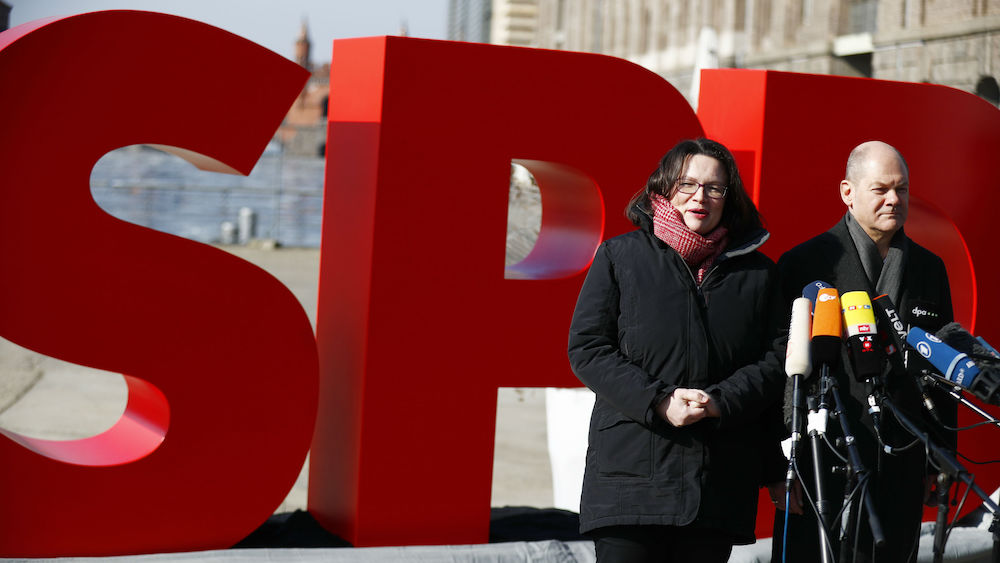SPD members voted to continue the grand coalition by a surprisingly large majority, opening the way to Angela Merkel’s fourth term in office. Germany’s new government looks stable for now, but it will face major challenges—on the economy, on refugees, and on European reform.
Joy was conspicuously absent on March 4 as Germany’s SPD leadership announced that Germany—nearly six months after the elections—was finally going to get a new government. A clear 66 percent of Social Democratic party members had voted in favor of joining another coalition with Angela Merkel’s conservative bloc, officials announced after an all-night count. “Now we have clarity: The SPD will enter the next federal government,” said a stony-faced Olaf Scholz, interim party leader and the likely future finance minister.
Angela Merkel can now be elected to her fourth term as chancellor in the Bundestag on March 14. The rest of the government will be sworn in before Easter, ending a period of stasis that had become painfully long—and not just for Germany itself, but for the rest of Europe as well. France’s President Emmanuel Macron in particular was desperately awaiting news from Berlin. His ambitious plans for renewing the Franco-German alliance and reforming Europe have been on hold because of the power vacuum in Germany, and with European parliamentary elections due in 2019 time for reform is ticking away quickly.
As expressionless as he looked, Scholz’s relief must also have been enormous, for the sake of the party as well as his own ambitions. This vote certainly didn’t come easy. Since the elections last September, which went disastrously for the SPD, the party has done a complete U-turn. From being dead set against participating in another Merkel government, it tortuously inched around to supporting the chancellor one more. This process was accompanied by a punishing leadership struggle, ending with the resignation of Martin Schulz from both the party leadership and the future cabinet.
Many of the 460,000 party members were convinced that the SPD was languishing in government under Merkel, forced to support policies that went against their pwn values and unable to get credit for their own successes. Merkel was not just stealing the glory, but deadening the very soul of Germany’s Social Democratic Party (they thought), with ever more catastrophic election results. Only time in the opposition could deliver salvation and renewal.
This same feeling still runs strong in the party, and not just with the third of members who voted against the new coalition. Yet in the end, a large majority approved the new government, partly out of a sense of responsibility toward the country, partly in sheer fear of what would happen to the SPD if new election were called now. The 66 percent who voted in favor of the coalition is a much larger margin than expected, giving Scholz and the designated new party leader Andrea Nahles the legitimacy to be constructive in dealing with Merkel.
In terms of personnel, the incoming German government has every chance to be stable. The SPD desperately needs time to recover before facing the voters again. Meanwhile, Merkel and her Bavarian ally Horst Seehofer know that without the SPD they will not be able to hold on to power. As it is, this is most likely Merkel’s last period in office, and she may decide to step down early—perhaps in 2020—to allow her successor time to gain profile in the job.
Yet coalitions tend to be based on wishful thinking, and Berlin’s new “GroKo” (short for Grosse Koalition, grand coalition) is no exception. The 179-page coalition agreement with its many detailed provisions for the policies to be enacted foresees large additional spending. More money for education, for social policies, for supporting refugees, and for defense, among other expenses, amounts to €46 billion in additional expenditure—or more, as economists have warned. At the same time, the new coalition wants to maintain a balanced budget.
Given strong economic growth, this could work—but there are no provisions for any slowdown. If US President Donald Trump’s policies cause a destructive trade war, or if bubbles in any major markets burst, GroKo will quickly have to switch to crisis management, both domestically and within the eurozone.
The second instance of wishful thinking concerns refugees. After enormous haggling, the parties in the new government have agreed to limit the overall number of refugees admitted to Germany to about 180,000 to 200,000 a year. But what happens if a new migration crisis kicks off, triggered by yet another conflict somewhere near Europe’s borders? The far-right Alternative für Deutschland, already the largest beneficiary of the renewed coalition agreement, is certain to profit.
The third major risk to the new government has less to with outside forces and more with policy difficulties. Merkel and her allies have very solemnly promised to help renew the European Union: they want to strengthen the eurozone, build European defense, create a common asylum system, and agree on a budget framework for the period 2020 to 2027. With the widening gap between eastern and western Europe, much of this may prove impossible.
“Habemus GroKo,” said Cem Özdemir from the opposition Green party after the SPD’s vote count, a jokey reference to how the election of a new pope is announced. But just as Germany and Europe were sighing relief, the next headache arrived. Only hours after the SPD announced it was joining the coalition in Berlin, Italian voters went to the polls. Now it’s the parliament in Rome that has no clear majority, but a strongly euroskeptic tendency. For Europe, interesting times are likely to continue.







